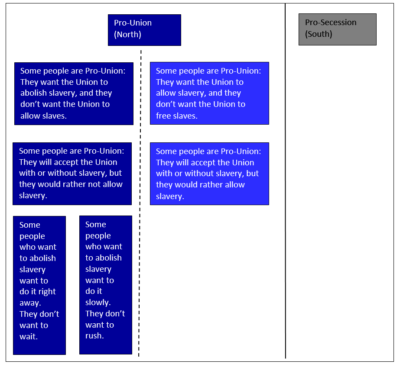Today is president’s day, the day we celebrate Washington’s and Lincoln’s birthday.
As it happens, I am currently reading Carl Sandburg’s biography of Abraham Lincoln. And, as it happens, today I read this excerpt from a letter he wrote on October 5, 1863:
“We are in civil war. In such cases there always is a main question; but in this case that question is a perplexing compound—Union and Slavery. It thus becomes a question not of two sides merely, but of at least four sides, even among those who are for the Union, saying nothing of those who are against it. Thus, those who are for the Union with, but not without slavery—those for it without but not with—those for it with or without, but prefer it with—and those for it with or without, but prefer it without. Among these again is a subdivision of those who are for gradual but not for immediate, and those who are for immediate, but not for gradual extinction of slavery.”
First of all, I marveled at his understanding of the complexity of the issue facing him and the nation, at the shades of loyalty to one cause or the other that he could parse out in a few phrases.
In those days people didn’t use bullets or charts. I put the ideas into slightly simpler language and into a diagram that I could use in my classroom.
 But Lincoln didn’t stop there. He went on. “It is easy to conceive that all these shades of opinion, and even more, may be sincerely entertained by honest and truthful men.”
But Lincoln didn’t stop there. He went on. “It is easy to conceive that all these shades of opinion, and even more, may be sincerely entertained by honest and truthful men.”
As I’ve been reading his biography I’ve been struck by how vilified Lincoln was while he was in office, not just by the South but by the North as well. We hear his name now and immediately think of the Lincoln Memorial. The Gettysburg Address. The national holiday. But while he was alive I think he felt he was fighting his own side almost as much as the Confederacy.
Instead of lashing out or complaining bitterly about all the groups opposing him, Lincoln makes this extraordinary statement. A wide range of opinions can be sincere. The people who have them can be honest and truthful even while they disagree.
That’s the best civics lesson I can bring back to school tomorrow.
Sometimes issues are complex.
People will disagree.
The ways they disagree may be complex too.
Even when people disagree with you, assume the best motives. Assume sincerity. Assume integrity. Carry on a conversation from there.
Thank you, Mr. Lincoln.
That president was awesome. This president? Not so much.